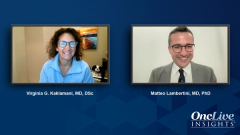
Breast Cancer Management: Future Directions in Fertility Preservation
Closing out their discussion on fertility preservation in breast cancer, Matteo Lambertini, MD, PhD, and Virginia Kaklamani, MD, DSc, look toward unmet needs and future evolutions in the treatment landscape and offer advice for community physicians.
Episodes in this series

Transcript:
Matteo Lambertini, MD, PhD:In terms of future perspective in this field, something that is striking to me on a negative aspect is that we still have a lot of questions regarding the use of ovarian suppression not only with chemotherapy but with [the] new anticancer treatment option that we have in the early setting. I don’t know whether you face this problem in your clinical practice, but I’ve already started to face it: how to counsel those women who, for example, use adjuvant olaparib after neoadjuvant or adjuvant chemotherapy [and have] BRCA-mutated [disease]. Should they continue ovarian suppression during olaparib [therapy] if they [have] triple-negative disease because of potential gonadotoxic effect of this treatment? The same applies for adjuvant pembrolizumab. Going back [to] what we have to do in this field, it’s not only [about] counseling patients receiving chemotherapy but particularly how to counsel those women who are receiving the new anticancer treatment option. We don’t know very well the risk of most of them, we don’t know the risk of treatment-induced infertility [and] premature ovarian sufficiency. And we don’t know whether we need to protect the ovaries of our patients when we use these treatments.
Virginia G. Kaklamani, MD, DSc: Yes, and that becomes a major issue. At least we have some data from the metastatic setting with the use of CDK4/CDK6 inhibitors and GNRH agonists. But again, those data did not look at fertility preservation. They just looked at suppression of estradiol so that patients could be on an aromatase inhibitor. That’s an extremely important point: that we have so many unmet needs in this space and so many clinical trials that we have to perform for safety [and] efficacy of all these procedures.
Looking into the future, how do you see this field evolving? What are other fertility preservation methods that might become available for our patients?
Matteo Lambertini, MD, PhD:In terms of future perspective, the most important one is to address the risk of infertility and premature ovarian sufficiency with the new treatment so that we know how to deal with our fertility preservation option in those women receiving such new treatments. In terms of fertility preservation strategies, what I want to see more [of] in the future is efficacy data in women with prior cancer diagnosis, because we know that there are effective strategies. But we lack a bit of prospective data in terms of pregnancy rates [and] outcomes of the pregnancies for those women who receive these strategies. And the positives: The trial is one example of a prospective effort that has tried to look into this information. The same would apply to GNRH agonists during chemotherapy. We need to prospectively follow these patients, also [with] the new anticancer treatment option, to address the efficacy on the fertility part, particularly in women with breast cancer. We know very well that the oocyte cryopreservation or ovarian tissue cryopreservation are effective strategies. We also have data in patients with cancer. But for the pregnancy outcomes, we need more prospective data in these regards.
Virginia G. Kaklamani, MD, DSc: Something that becomes a huge barrier is access: access to an oncofertility team, access in the sense of women being able to afford to do these procedures, especially in the setting of knowing that they will have a lot of bills to pay with chemotherapy and with surgery and radiation therapy. How do they think that this is the right time to have embryo or oocyte cryopreservation when they’re starting their journey of breast cancer treatment? This also falls into our hands: to educate them and help them calmly understand the different options that they have. Looking at what our fertility colleagues are looking at, the artificial oocyte development is something exciting and maybe will revolutionize the future of fertility where we can offer it to a different age group of patients. That will be exciting for us to see from our standpoint.
Matteo Lambertini, MD, PhD:On the education part, it’s important that as medical oncologists who are educated more on this aspect, and this applies not only to breast cancer specialists but also colleagues who are working in other fields. I am thinking of, for example, melanoma in the early setting. We are using immune therapy [and] other targeted treatment options where we don’t know how to counsel this patient. And fortunately, we cure them. We are much better [at] curing these women, so we need to pay more attention to this viable field, not only in breast cancer but [in]…cancer care in general.
Virginia G. Kaklamani, MD, DSc: Matteo, if you were to talk to a community physician and give them advice on this subject, what would you tell them?
Matteo Lambertini, MD, PhD:To discuss with all women…reproductive years, to discuss the risk of treatment-induced premature ovarian sufficiency as we discuss all other [adverse] effects of treatment: nausea, vomiting, and so on. So this has to be done. It’s not our choice to access this procedure or to decide whether the patient has already won… It’s a shared decision. The patient should be informed that there [are] the [adverse] effects. There are possibilities to overcome, to avoid, or to reduce the risk of developing these [adverse] effects, and [it] is the patient choice to undergo or not [undergo] this different procedure.
Virginia G. Kaklamani, MD, DSc: That’s what I was going to say [as well]. We have to let the women know and then let them make a decision that’s the right decision for them.
Transcript edited for clarity.




































